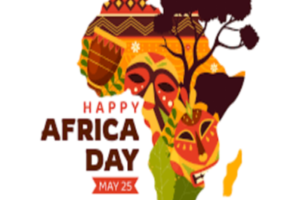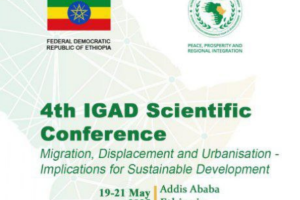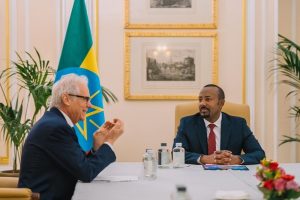On the occasion of the endorsement of the president’s inaugural address to the joint session of parliament several questions were presented by MPs to Prime Minster Abiy Ahmed. The questions the MPs posed were all encompassing the major national issues of the country. Many of the questions even had the spirit of challenging the government on the way things were moving in the country. In fact the parliament was exercising its constitutional mandate of oversight on how the executive was carryout its responsibilities to citizens. These are activities that we see in every democratic nation where power is always eventually controlled by the people. That was also why the premier was in parliament to respond to the questions of the MPs.
The MPs’ questions encompassed almost every social issue from the very crucial and alarming peace and security issues to the economic challenges including inflation the country faces; from the project execution shortcomings to the issue of corruption that appears to stifle the major efforts of the country to perform as it should; from questions of infrastructure to diplomatic overtures with foreign countries; from the Horn of Africa geopolitical complexities to Ethiopia’s quest for access to a sea port as well as issues of youth education and employment.
Most of the questions were a demand for the explanation by the premier of what his government was intending to do in order to be up to the task of addressing all those urgent issues and the sort of progress he was making.
The premier has been very frank and open in many of his answers admitting that there were several challenges that were very difficult to cope with under the current global circumstances and some of them would need years to address adequately. In many of the issues that concern the peace and security of the country the premier was apt to warn that all those who believe to depose a legitimately elected government using force was unthinkable except that they become obstacles to the growth and stability of the country and keep us busy in security issues rather than engage in development endeavors that would change the lives of millions.
The premier then invited all those who have issues with his government had better present their ideas peacefully and now that there is the National Dialogue Commission it is an opportunity not to be missed. He said while we have lost similar opportunities to address these perennial issues that came rolling over the decades past, it would be a grave mistake to miss this one as well.
He mentioned the various past attempts to overthrow the monarchy during the December 1960 attempted coup, the 1974 takeover of the Derg on the monarchy, and then the 1991 introduction of the EPRDF government as missed opportunities of once and for all discussing the major fundamental issues the country was facing. They were opportunities he said to seek the appropriate solutions and then embark on a process of closing all those diverse narratives that came to be built up along the decades and envisage a new nation with a common narrative and common sense of purpose and objective.
The premier stated that after years now we have a new opportunity to come together around a table and express our grievances, sentiments and issues so that they are all discussed frankly and openly without excluding any one, including those who have taken up arms and are trying to fight this government by force. He urged them all to put down their arms and come to the negotiating table so that within the framework of the constitution everything is admissible.
The premier said his focus has always been on the peace of the country and gave priority to peaceful negotiations to resolve any issue. He said he would never chose to resort to using force and that is why he has once again invited all those who have issues with the government to freely present their case at a negotiating table. In this regard the establishment of the National Dialogue Commission is fundamental and vital to present any issue to the fore and have it discussed with the participation of representatives of communities and groups of people.
The premier was heard insisting that only united we can address all the outstanding issues of the country and the participation of each and every citizen is key. Just as we have resolved the issue of the construction of the GERD together, he noted, we can solve the problems of peace and security only if we are all united and pull in to one direction rather than giving chances to all those who do not want Ethiopia to grow and prosper and be an African standard bearer.
Talking about economic issues the premier presented some of the positive numbers that highlight the progress in the economic growth that has been witnessed even by the IMF. However, he did not deny that the issue of inflation is still up front among the major vital issues on which his administration was working day and night. Mentioning that unfortunately the issue is international and that even the developed countries are plagued by unprecedented rates of inflation, however, their economic policies to face this issue have brought about extra burden on countries such as Ethiopia which owe a lot to these advanced economies because their increase in interest rates affects negatively Ethiopia. Developing countries such as Ethiopia are struggling to cope with this world wide inflationary tide and without addressing the issue of better incomes for house-holds people in the lower income bracket are destined to suffer most.
The premier said that of course his government is working day and night to come to terms with this issue with continuous economic reforms such as encouraging increase in production and lessening dependence on imported goods. Substitution of imported products by homemade ones helps us save our foreign currency reserve and one outstanding example is the recent harvesting of millions of quintals of wheat using irrigation. This has not only stopped import of wheat but we have now begun to export it and earn foreign currency, the premier noted. These are positive moves but a lot needs to be done to tackle all the economic issues of the country adequately and he stressed if we follow current tendencies the problem will begin to be less and less burdensome in the coming years.
Diplomacy wise there were several questions by the MPs that concerned Ethiopia’s quest to access a sea port, and if there were risks of another round of conflicts with neighbouring countries. The premier ruled out any such possibility because Ethiopia’s request for a sea port is based on a win-win principle, on a give and take move. People should not be amazed if they see Ethiopia showing strong interest in a Red Sea port and take a strategic view of the area while a score of countries from afar and beyond have shown significant interest in the area. The premier said Ethiopia’s quest for access to sea is a matter of survival especially in perspective because as the population increases, the economy expands and interaction with foreign markets skyrocket the need for a sea port is inevitable. It is he said in the interest of neighboring countries as well that Ethiopia get access to the sea so that the internal fever gets reduced with better economic achievements and there would be no urge to move outside or emigrate using all means, both legal and illegal, and prevention is better than cure.
Ethiopia is simply anticipating a scenario whereby in the near future the situation in Ethiopia could be out of control economically because of lack of access to sea and the fact that Ethiopia has to rely mainly on one port only has its own issues.
Any unpredicted political or security crisis would have direct impact on the economy of Ethiopia because Djibouti is the lifeline of Ethiopia. That is why the premier said Ethiopia extends its hands to neighboring countries to give her access to sea in a commercial transaction based on the principle of give and take and not by using any form of intimidation or threat as some people have tried to go out of their way and envisage a doom’s day scenario. Ethiopia will not pull the trigger against any of its neighbors and has never done that in the past. Its relations with neighbors and others are based merely on mutual respect, mutual sovereignty and only safeguarding the national interest of the country without encroaching on the sovereignty of others. The history of Ethiopia is a clear witness to this diplomatic principle of the country, the premier concluded.
BY FITSUM GETACHEW
The Ethiopian Herald November 19/2023




